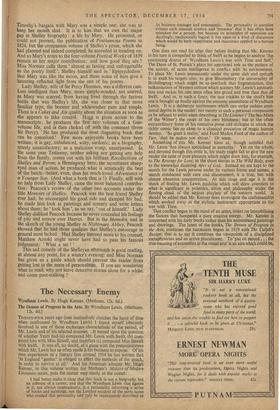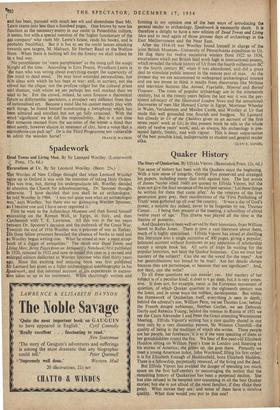The Necessary Enemy
Wyndham Lewis. By Hugh Kenner. (Methuen. 12s. 6d.) The Demon of Progress In the Arts. By Wyndham Lewis. (Methuen. 12s. 6d.) TWENTY-FOUR years ago (one instinctively clutches the hand of time when confronted by Wyndham Lewis) I found myself obscurely involved in one of those exchanges characteristic of the period, of Mr. Lewis and of his selected enemies. It turned upon the question of whether Yeats had (a) compared Mr. Lewis with Swift, (b) com- pared him with Miss Sitwell, and therefore (c) compared Miss Sitwell with Swift. 'It was all, no doubt, of a piece with the pretentiousness which Mr. Lewis has so often made it his business to expose. Of his own experiences as a literary lion around 1914 he has written that 'in England "genius" is obliged to affect the methods of the quack, in order to survive at all.' And his American admirer Mr. Hugh Kenner, in this volume written for Methuen's Makers of Modern Literature series, puts the matter very neatly at the outset: its business manager and amanuensis. The personality in question evinces such unusual acumen and 'presence' that it has often been mistaken • for a person, but because its principles of operation are dazzlingly, mechanically logical it lies open to a kind of discussion which would be both impertinent and inaccurate applied to a human being.
One does not read far after that before finding that Mr. Kenner in his turn is compelled to think of Swift as -he begins to analyse 'the continuing drama of Wyndham Lewis's war with Time and Sell.' The Dean of St. Patrick's plays his appointed role as the pattern of the satirist, of acute intelligence in conflict with its environment. To place Mr. Lewis prematurely under the same slab and epitaph is to exalt his targets also, to give Bloomsbury the universality of Brobdingnag: which might be to overlook that fragmentation, that balkanisation of Western culture which scatters Mr. Lewis's ammuni- tion and makes his aim seem often less grand and true than that of Swift. And as, in such a fancy, the tear trickles to the rival's bier one is brought up finally against the uncanny anaesthetic of Wyndham Lewis. It is a deliberate tearlessness which can strike sudden emo- tional depths in the reader: not merely in such a personal compassion as he refused to enlist when describing in The Listener (*The Sea-Mists of the Winter') the onset of his own blindness; but in the often extraordinary force of his narrative prose and dialogue in which the richly comic lies so close to a classical evocation of tragic human destiny. 'So great a realist,' said Ford Madox Ford of the author of Tarr, 'that he makes you shiver.' Or weep.
Something of this Mr. Kenner hints at, though satisfied that Mr. Lewis 'has always specialised in unreality.' Yet on the whole, and devoted though this critic is, his study might fail to give the new reader the taste of pure pleasure which might draw hini, for example, to The Revenge for Love, to the short stories in The Wild Body, even to the somewhat daunting Apes of God. Instead we are kept to the search for the Lewis persona under its various forms and names, a search conducted with care and discernment, it is true, but with almost obsessive concentration. At this stage and age it is the shock of finding Mr. Lewis readable which will draw attention to what' is significant in polemics, satire and philosophy under the flowing cloak of the serious playboy of the western world. It should be added that Mr. Kenner does investigate the craftsmanship which worked away at the stylistic instrument appropriate to the war with Time.
That conflict began in the mind of an artist, in*nt on immobilising the factors that hampered a pure creative energy. Mr. Kenner is concerned with his forty books rather than his unnumbered paintings and drawings. The latest of the books, The Demon of Progress in the Arts, continues the succession begun in 1919 with The Caliph's Design: that is to say it combines the viewpoints of a disciplined metaphysician and an active practitioner. To 'put on record ... the true meaning of extremism in the visual arts' is an aim which could be,
and has been, pursued with much less wit and shrewdness than Mr. Lewis crams into less than a hundred pages. One knows by now his fOnction as the necessary enemy in our midst (a Paleolithic culture, it seems, but with a special mention of the 'higher functionary of the gas company' who visits Mr. Lewis's house, reads his books, and is probably Neolithic). But it is fun to see the sunlit lances streaking towards new targets, M. Malraux, Sir Herbert Read or the Welfare State. When there is nothing left for the Enemy we shall indeed be in a bad way.
No pamphleteer (or 'mere pamphleteer' as the stung call the wasp) is,,right all the time. According to Ezra Pound, Wyndham Lewis is 'the man who was wrong about everything except the superiority of 1170e mind to dead mind.' He may have wounded personalities, but 10,,is ideas with which he has been at war: and, as carriers, not the crowd but the clique, not the profane vulgar but the cultural priest and shaman, with whom we. are perhaps less well stocked than we used to be. For the crowd, indeed, he once foresaw a theoretical future as dithyrambic spectators, a prospect very different from that of nationalised art. Because a mind like his cannot merely play with such things, he found himself constructing a metaphysic which has been admired and attacked but not yet fully criticised. With the word 'significant' we let fall the responsibility. But is it not time that someone rescued from the sea-mists of the winter a Mind that must surely, however elusive its tenement of clay, have a voice that a microphone can pick up? Or is the Third Programme too vulnerable



































 Previous page
Previous page